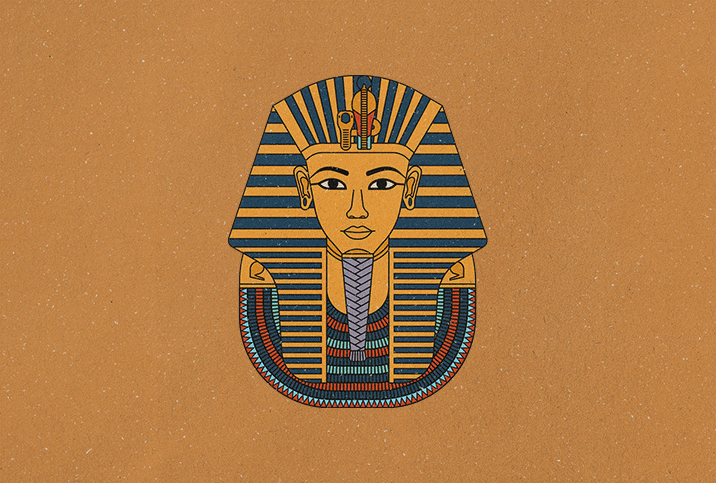Did Egyptian Pharaohs Masturbate into the Nile?

Picture the god-king of one of history's greatest empires standing with his feet sinking into the soft, fertile banks of the Nile.
Drawing aside his robes with a solemn flourish, he grasps his penis and begins to pump away. As he finishes, his subjects breathe a sigh of relief and watch his semen drift lazily downriver. Another year of plenty is ahead.
Is there truth to the Egyptian masturbation story?
That's one interpretation of an unproven tale that circulates on the internet on a regular basis.
Despite the popularity of this online anecdote, any further information on the alleged ritual is scarce—such as when, in the roughly 30 centuries of Egypt's civilization, the ritual was practiced, or where any archeological or historical evidence of the ceremony originates.
Accounts of this ritual that do exist are accompanied by small details. One calls the rite an important part of a fertility festival to honor the fertility god Min, while another suggests the pharaoh made sure to ejaculate with, rather than against, the current.
New York author and journalist Jonathan Margolis published "O: The Intimate History of the Orgasm," which offers a little more background on the mysterious masturbation ritual. In his account, the ceremony takes on even more significance as the foundation for Egyptian creation myths.
"The tradition supposedly went back to a primary event in the various versions of the creation myth of the time, although if you think about it, the creation myth must have been invented as a post-rationalization of the Nile masturbating ceremony," Margolis wrote.
Fact-checking the pharaoh
Neither Kara Cooney, professor of ancient Egyptian art and architecture at UCLA, nor her colleague Jonathan Winnerman, an ancient studies lecturer and academic administrator, have ever come across evidence of public masturbation ceremonies in Egypt.
Winnerman said he was familiar with the purported story and actually looked into it himself. So far, his search has come up empty.
"To my knowledge there is absolutely no evidence that the king ever publicly masturbated into the Nile," he said. "There, of course, could be some obscure reference I am not aware of around which the claim is based, but I have done some searching for this myself and have never been able to find it."
There is some evidence for the Min festival, he added, but it seems a much tamer affair based on its depiction on the walls of the Temple of Millions of Years at Medinet Habu.
'To my knowledge there is absolutely no evidence that the king ever publicly masturbated into the Nile.'
The sole detailed scholarly source on the Min ceremonies is from 1956, C.J. Bleeker's "Die Geburt eines Gottes," or "The Birth of a God," which Winnerman said is outdated and exclusively written in German.
But a 1985 translated master's thesis by Marie-Francine Moens, today a computer scientist in Belgium, cited Bleeker's work and provided some description of how the festival might have gone down: The Min ceremony did feature an erect penis at center stage—though it belonged to a statue of Min rather than the pharaoh.
The festival, which was led by the king, involved a procession of men carrying a standing statue of Min out of the temple and ended with final offerings to the god.
Notably, Moen pointed out that depictions of the altar seemed to feature heads of Egyptian lettuce, which, when sliced, oozed a milky white sap. Moen speculated that the ancient Egyptians associated this gooey liquid with Min's sperm.
What part of the Egyptian masturbation myth is almost true?
Like a lot of speculative historical stories that catch on, there's a ring of truth to the Nile masturbation ritual. The association between masculine fertility and the Nile is in step with ancient Egyptians' conception of the river that brought life to their civilization, according to Cooney.
Every year, the Nile overflowed its banks during a season the ancient Egyptians called "akhet" (inundation). Their civilization relied on this flooding to water and fertilize their agricultural fields.
The amount of flooding each season determined whether the year would bring "plenty or famine or something intermediate," Barbara Bell explained in 1970 in the Geographical Journal.
"I do agree that the Nile inundation was seen as a mighty ejaculation, if you will," Cooney said.
Semen, penises, masturbation and their association with fertility also factor heavily into ancient Egyptian mythology. Several of the fertility gods, including Min, were depicted in statues and paintings with erect penises, and the earliest colossal statue of Egyptian divinity appears to show a god masturbating—an "erect penis with hand wrapped around it," Cooney added.
Finding hard evidence is, indeed, hard
It's always possible that evidence of a Nile masturbation ritual exists somewhere in the archives, Winnerman asserted. Part of the challenge of studying Egyptian religious rituals involves piecing together archeological information from a culture that did not record, classify or describe things in the same ways we do today, Winnerman explained.
With the exception of a few stray surviving papyri, most of what we do know about Egyptian religious rituals must be gleaned from their depictions on the temple walls themselves.
These typically portray isolated rituals, rarely offering a complete record of any one religious festival, Winnerman said.
If some reference to the Nile masturbation ceremony did exist, it's possible—even probable—that it wouldn't be mentioned in the context of the Min festival, Winnerman said.
In other words, it could be just about anywhere in the vast collective Egyptological archives.
"One would have to consult the full range of Egyptian funerary and magical texts from every period, as rituals and myths could be referred to in any of these as divine precedent," he said.
But Winnerman is still pretty sure accounts of Nile masturbation rituals are a product of much more recent mythmaking, despite their resonance with historically documented rituals and beliefs.
"I suspect that the claim that the pharaoh masturbated into the Nile is an old Egyptological myth, though one not inconsistent with the general gist of Egyptian religious beliefs," Winnerman said. "From this perspective, it is almost more metaphor than fact."

















